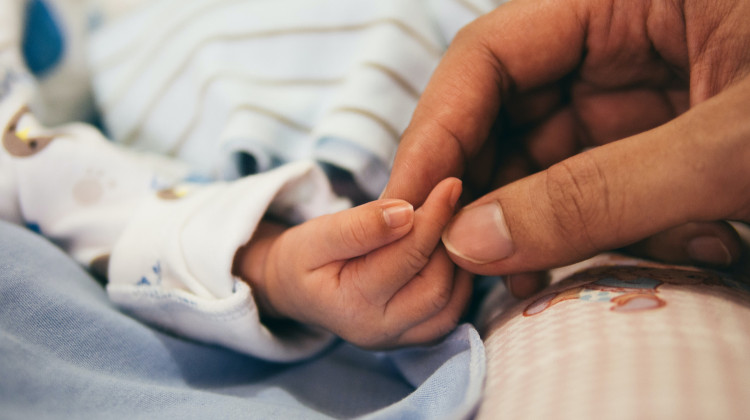
In 2020, 92 women in Indiana died during pregnancy or up to a year after giving birth.
Aditya Romansa/UnsplashMaternal mortality rates are on the rise in Indiana. The most recent maternal mortality report by the Indiana Department of Health, released in late September, shows in 2020, 92 women died during pregnancy or up to a year after giving birth.
IDOH’s Maternal Mortality Review Committee looked at two kinds of maternal deaths, following standard definitions set by the U.S. Centers for Disease Control and Prevention:
- pregnancy-related death: a death during pregnancy or within a year after from a chain of events initiated by the pregnancy, or by an unrelated condition that was aggravated by pregnancy.
- pregnancy-associated death: a death during pregnancy or within a year after, irrespective of the cause.
Indiana has seen an uptick in both types of maternal deaths in recent years. The state has historically had one of the nation’s worst maternal mortality rates.
In 2020, the rate of pregnancy-related deaths nearly doubled compared to two years earlier to 23 deaths per 100,000 in 2020 — up from 12 deaths per 100,000 in 2018. The rate of pregnancy-associated deaths increased from 77 per 100,000 to 117 per 100,000 over the same time period.
The state’s Maternal Mortality Review Committee determined that the leading factors behind pregnancy-related deaths in Indiana are:
- Weakened heart muscle, known as cardiomyopathy
- Anxiety disorders, including post-traumatic stress disorder
- Amniotic fluid embolism, which is a rare condition that happens when the fluid that surrounds the fetus or fetal cells enter the pregnant person's bloodstream
- Septic shock, which happens when the patient’s blood pressure drops to dangerously low levels in response to an infection
The majority of pregnancy-associated deaths –– 83 percent –– happened postpartum, with 60 percent occuring after six weeks of giving birth. Substance use disorder was the most common contributing factor, causing 43 percent of all pregnancy-associated deaths in Indiana in 2020. Mental illness, obesity and discrimination were also ruled as potential contributing factors behind some of these deaths. Discrimination is defined in the report as “treating someone less or more favorably” based on things like race, obesity, substance use or maternal history.
The data shows 3 out of 4 pregnancy-associated deaths occurred among women who were covered by Medicaid, the federal-state health insurance program for low-income individuals and people with disabilities; about 21 percent were covered by private insurance.
In recent years, the rates of pregnancy-associated deaths rose for every age group, and the greatest increase is among young women between 25 and 29.
Maternal deaths rates are higher among Black women than White women across the U.S., including in Indiana. In 2020, Black Hoosiers were twice as likely to experience pregnancy-associated death as White women. Nationwide, Black and American Indian/Alaska Native women are three times as likely to die from a pregnancy-related cause as White women.
The Maternal Mortality Review Committee determined that nearly 80 percent of all pregnancy-associated deaths in Indiana were preventable, which is in line with national trends.
To prevent future deaths, the committee recommends increasing access to mental health services and bolstering the number of providers for mental health and substance use disorders. Access to addiction treatment can be an issue for pregnant and postpartum women, so the committee recommends efforts be made to remove barriers to substance use disorder treatment and to increase public funding for:
- Early child care, beginning in infancy
- Comprehensive, evidence-based sexual education
- Universal access for long-acting reversible contraception, like IUDs
- Medicaid and insurance coverage for medical procedures
- Access to public transportation and funding for medically necessary vehicle
- Modifications, such as seat belt extenders for people with obesity
The CDC estimates that 700 women in the U.S. die from pregnancy-related complications every year. A new national report from the agency finds 4 in 5 of these deaths could have been prevented and about half occurred between seven days to a year after pregnancy.
Leading underlying causes of pregnancy-related death nationwide include mental health conditions, including deaths due to suicide and oversodes; excessive bleeding, and heart conditions.
This story comes from a reporting collaboration that includes the Indianapolis Recorder and Side Effects Public Media, a public health news initiative based at WFYI. Contact Farah at fyousry@wfyi.org. Follow on Twitter: @Farah_Yousrym.
 DONATE
DONATE





 View More Articles
View More Articles



 Support WFYI. We can't do it without you.
Support WFYI. We can't do it without you.